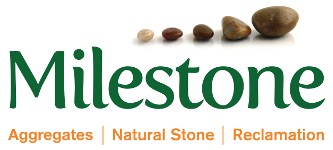Last blog articles
Blog archives
Search on blog
Decorative aggregates: a quick comparison
Whether you’re looking to decorate your flower beds, create an attractive stone feature or cover your driveway, decorative aggregates can be used to greatly enhance your garden.
1. Slate
Slate is a natural material that has versatile qualities. It usually comes in three colourways, but blue is by far the most popular option for homeowners. Many people choose slate as a decorative feature within their garden because it can be used to embellish bedding plants, rockeries, driveways and water features.
Slate is not only visually attractive, but it also has a few practical benefits too. When adding to bedding plants, it prevents sunlight from reaching the soil where weeds are likely to grow. It should also improve the quality of the soil by preserving moisture, especially during hotter spells when you’d constantly need to be watering the soil.
Try our 20mm blue slate for size.
2. Gravel
Gravel is one of the most common decorative aggregates used within gardens and landscapes. It’s made up of an array of stones that are typically round and smooth, and can be used to achieve a stylish finish when used for driveways and patios. In most cases, you can choose gravel in your desired shade.
We stock flint gravel and golden flint gravel in 10mm and 20mm specifications.
3. Limestone
20mm limestone is much chunkier and angular than gravel, meaning it provides a decidedly more contemporary finish.
Limestone aggregate is extremely hard-wearing and it won’t be shifted about too easily when applied to heavy use areas, such as driveways. What’s more, when you add limestone to topsoil, the calcium carbonate and magnesium carbonate elements within the material will naturally alkalise the soil.
4. Granite
Thanks to its durable nature, granite is perfect for use within driveways and pathways. Investing in slightly chunkier granite would be recommended if it’s intended to be used in heavy-duty areas, as smaller sized rocks can get caught in tyres and shoes easily.
One of the many benefits of granite is that it soaks up excess water after rainfall, which stops puddles from forming and minimises the risk of trips and falls.
For a slightly different take on traditional granite aggregates, try our silver grey variety.
5. Basalt
Basalt is a by-product of volcanic rock that’s perfect for adding to your bedding plants and using within organic farming. It’s a firm favourite with many gardeners, as it’s proven to increase plant and crop growth thanks to its nutrient-rich qualities.
When you first purchase basalt, it will be dark grey in colour, before turning to a red-brown once its iron-based composition oxidises. Adding basalt to your soil is a low-cost and low-maintenance way of restoring the soil by imitating biological events.
Our black basalt is a great starting point – it’s a dark charcoal colour when it’s dry, but turns to a gorgeous jet black when wet.

 How to measure up for your landscaping supplies
How to measure up for your landscaping supplies
 Things to do in your garden before the spring kicks in
Things to do in your garden before the spring kicks in
 5 lesser-known facts about rock salt
5 lesser-known facts about rock salt
 How snow and ice can damage your property
How snow and ice can damage your property
 Flat pebbles for a heart-warming lockdown keyworkers initiative
Flat pebbles for a heart-warming lockdown keyworkers initiative